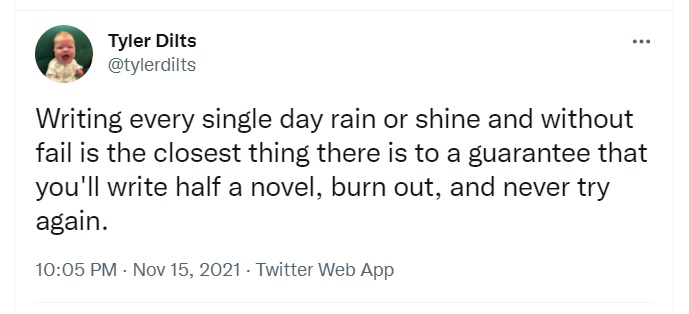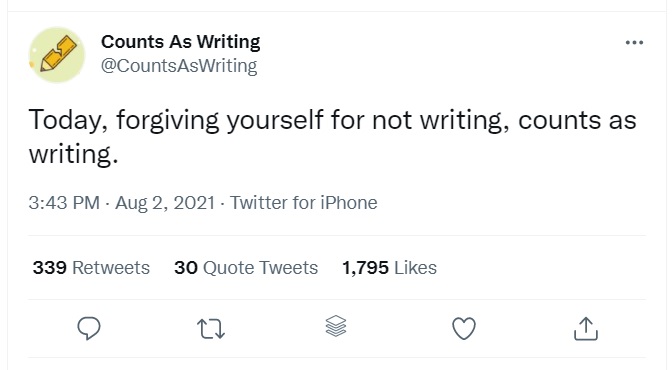Author Tyler Dilts recently made an observation on social media that helped me solve a mystery:

Writing every single day rain or shine and without fail is the closest thing there is to a
guarantee that you’ll write half a novel, burn out, and never try again. @tylerdilts 11/15/21
Dilts was talking about the unrealistic, overly demanding, and unkind expectations we often impose upon ourselves as writers. Like the way I throw myself into National Novel Writing Month like I’m throwing myself in front of a steamroller–I approach it with ferocity, like I’m going into the ring up against The Undertaker, Rowdy Roddy Piper, and The Million Dollar Man, all at once.
This year, I participated in NaNoWriMo for the 5th time. I did so because I’ve been overwhelmed with work and other commitments, I’m trying to finish a novel, and I’m not getting as much writing done as I’d like. So right as my schedule began to clear up, I decided it would be a great idea to add something new to my plate and force myself to write more. I wrote over 27,000 words in the first 16 days of November. I wrote at least 1,667 words on each of those days because, in addition to other achievements, participants are awarded a virtual badge for meeting the average word count daily, without fail. Something in me won’t let me fall short of my daily word count. And something in me won’t let me not win that badge.
Something in me.
I’m not here to disrespect NaNoWriMo. It’s a fantastic idea and a great organization that does a lot of good. It can be quite beneficial for writers. I think it’s especially helpful for writers who are where I was eight years ago–writers who are trying to get into the habit of writing regularly or who want to prove to themselves they can write a book (reader, you can). For even established writers, it can help jump start a new book, and it can be a fun way to engage with your writing community. It’s a nice annual tradition as we head into the dark winter months. As a matter of fact, the book I’m polishing up now started as a NaNoWriMo half-novel in 2013. It was an empowering experience for me to actually finish writing that half a draft. It showed me I could write regularly during a time when I was telling myself I never had time to write, and it showed me I could write a book. It was a life-changing experience. But over the past few days, I’ve come to realize that NaNoWriMo, much like Farmville, is no longer good for me.
It came to me shortly after I posted this on Twitter on Tuesday morning:

Is NaNoWriMo trying to kill anyone else? Or is it just me? Something BIG &
NOT GOOD happens EVERY TIME I do it. I almost died in Nov. 2013! I joke about
it, but this year, they’re replacing gas lines, gas has been shut off ALL MONTH &
I’ve had a respiratory thing ALL MONTH. WTH? @leannebythesea 11/16/21
And then I saw Tyler Dilts’s post come up in my timeline again and retweeted it. And then I began to put two and two together. Is it by coincidence that I’ve gotten seriously ill every time I’ve participated in NaNoWriMo, when I don’t get so seriously ill other times of the year? And when I don’t get so seriously ill during other Novembers in which I don’t participate in NaNoWriMo? Maybe. I don’t know.
But I do know this: One of the reasons I’ve done NaNoWriMo in the past is because I know myself. I’m highly strung. I’m wound up tight. I can’t stand to fail. I hate not following through on something. Participating in NaNoWriMo weaponizes those traits. If I commit to writing 1,667 words every day for a month, I will do it even if it kills me. In 2013, it nearly did. Midway through November, I became so stubbornly ill my doctor wanted to hospitalize me. Twice. I don’t blame NaNoWriMo for my illness. I had an antibiotic-resistant infection, and I refused to slow down and listen to what my body was trying to tell me. I kept going until I no longer could. And what did I do as soon as I began to get well and was able to drag myself to my kitchen table again? I wrote between 5,000 and 10,000 words a day for three or four days to catch up and finish NaNoWriMo. Of course I did.
This year, I started feeling short of breath on Thursday, November 4th. The doctor couldn’t find anything physically wrong with me. I’d gotten my COVID-19 booster the week before. I’d had my flu shot. I tested negative for COVID-19 twice. A chest x-ray was clear. My lungs sounded fine. My temperature, oxygen saturation, and respirations were all normal. “Have you been feeling anxious about anything?” the doctor asked.
“Of all the stratagems, to know when to quit is the best.”
–Chinese Proverb
I kept writing those 1,667 words a day. By the following Thursday, I was feeling much worse. I also felt exhausted. I didn’t want to do all of the things I normally enjoy doing, including going out for walks or writing. Of course, you don’t know me, so you’ll have to take my word for it: I am a human dynamo. I get things done. This wasn’t normal for me. Over the weekend, I didn’t think I could write another word. But I did. I wrote thousands of them. And then on Sunday evening, I slowed down. After a long, hot shower, and over a comforting bowl of chicken noodle soup, I began to relax. I began to consider quitting NaNoWriMo, and I began to feel better. Which meant, of course, that by Monday morning, I was feeling well enough to continue NaNoWriMo.
To be fair, there were other things causing me anxiety, too. I had a deeply personal essay come out on November 9th. The gas in my bungalow was shut off for three weeks, which was a nightmare. And I live in California–there’ve been controlled burns in my county the last couple of weekends in an effort to prevent wildfires, which has meant a great deal of smoke in the air. Then there’s work, school, volunteer commitments. A global pandemic going on two years.
Most of that, I can’t control. I can’t control how people respond to my essay. I can’t control how fast my landlord replaces the gas lines. (And neither can he, God bless him, he’s doing the best he can.) I can’t control the wildfires. I can’t control the pandemic–I can only do my part. But there was one thing causing me anxiety that I could control. I could decide not to force myself to write 1,667 words a day every day for a month, when my body clearly needed a break, for no good reason other than my aversion to “failing.” (And the badges.)

What I’m writing here may sound contrary to other things I’ve written. I wrote recently about some of the things I like and don’t like about National Novel Writing Month (NaNoWriMo: Preparing for 50,000 Words), and I also wrote about Structuring Your Writing Life. In both of those posts, I extolled the benefits of writing each and every day. I’ve written about Game Theory and Writing–I do believe gamifying writing goals can help writers achieve those goals, and NaNoWriMo is a great example of that. In another post, Time Is on My Side, I wrote that I have a daily writing practice–I keep a large calendar on my wall and mark an X through each day once I reach my daily writing goal.
But in those same posts, I also wrote that “long strolls and … periods of time when you are not thinking about your book are essential,” and I shared that my daily writing goal is this: to write for ten minutes each day. Only ten minutes. I’m easy on myself in my daily writing life. I wasn’t always, but I’ve learned to be. My writing mentors and role models have helped me to create a productive and enjoyable writing life. Mary Yukari Waters helped me see that I was sapping the joy out of my writing life by being overly rigid. Jill Alexander Essbaum was particularly instrumental in teaching me to take my creative days as they come and to revel in wherever those days may take me. She showed me what a productive and enjoyable writing life can look like, and she taught me that such a life should include things like getting plenty of fresh air and exercise. Deanne Stillman taught me that things take as long as they take and not to rush them. Tod Goldberg taught me that it’s okay to take a break, but it’s not okay to give up. They all taught me to enjoy being creative and to be more kind to myself.
“This time, quitting when it was against my nature to quit felt like the win. I felt like I had my life back, a creative life I’ve worked hard to build over the last two and a half years. I felt joy.”
I do believe in building good habits and in working hard to reach your goals. But NaNoWriMo may not be the thing that works for everyone. And it may work at one point in life and not at another. My personality can be hardcore. I take things to extremes. Left to my own devices, I can turn just about anything into such demanding work that I take the fun out of it. I’m the Monica Geller of writing competitions. For me, NaNoWriMo brings out an unhealthy side of my personality.

These days, I choose to write at least ten minutes a day because that gets me sitting down at the keyboard. Once I start writing, I usually get into it and write for much longer than ten minutes, and I enjoy it. Most mornings, me and Walter Mosley can be found at our keyboards well before sunup and for several hours after. But if all I’ve got in me is the ten minutes, that’s okay. I stop and mark the X on my calendar. Beyond the ten minutes, my daily writing practice usually means continuing to work on my current WIP. But sometimes, my definition of writing is much more flexible. It might mean submitting a few stories to literary journals–I’ve done something toward my writing goals, so I mark the X on my calendar. It might mean taking a walk on the beach while working out a plot point in my head, getting to know a character, or brainstorming an idea for a new story. Counts as writing. I mark the X on my calendar. Today, writing this post counts as writing. On Sundays, taking a break from my computer to rejuvenate my soul counts as writing. As long as I do it deliberately and thoughtfully, it counts.

Today, forgiving yourself for not writing, counts as writing. @CountsAsWriting 08/02/21
I was already considering giving NaNoWriMo up by Sunday evening, because I was physically and emotionally wiped out and felt like dirt. But on Tuesday, Tyler Dilts’s tweet helped me connect the two things. I realized I was so caught up in word count that I wasn’t enjoying myself anymore. I started out like gangbusters, but after about 10,000 words, the words I was writing weren’t substantially contributing to me finishing my book. They were, however, substantially contributing to my anxiety. I’d fallen back into my old habit of being an overly rigid killjoy, and I literally made myself sick.
I deleted my NaNoWriMo account Tuesday night and went back to the daily writing practice I love. And I am feeling much better. To be fair, there are other reasons I’m feeling better, too. The smoke has cleared out of the air in my neighborhood. I got a lovely, heartwarming message in response to my essay that made all the anxiety leading up to its publication worthwhile. My gas was reconnected Tuesday evening and my hot water heater was fixed last night. And I took up coffee again after a three-day break–I love coffee. But I have to be honest–I felt a weight lift from my chest when I deleted my NaNoWriMo account. This time, quitting when it was against my nature to quit felt like the win. I felt like I had my life back, a creative life I’ve worked hard to build over the last two and a half years. I felt joy.
I came out of this aborted NaNoWriMo attempt with 27,000+ words, including a new, 10,000-word draft of a story that takes place in the desert on the 20th anniversary of Gram Parson’s death. It’s a story I love. I can’t stop thinking about it. I am anxious to start revising it. It suddenly made no sense to me to keep writing new words I wasn’t enjoying writing in order to earn quite-colorful-and-nice-to-look-at-but-still-virtual badges, when what I really wanted to do was to begin rewriting this story I am excited about. (The other 17,000 words are mostly rubbish, to be honest.)
“Knowing when to quit is probably a very important thing, but I just am not ready.”
–James Taylor
So I quit NaNoWriMo, and I’m okay with that. I deleted my account because my personality is also such that, if I hadn’t, two days from now I’d have logged back in and decided I could still buckle down and make my word count in time. It was one of those decisions you tussle with, but once you’ve made up your mind, you know it was the right decision.
Please understand, when I say to know when to quit, I do not mean to quit writing or to give up on your dreams. I don’t mean to quit NaNoWriMo either–if it’s feeding you and empowering you, fantastic. Keep going! You’ve got this! It’s a personal choice. But know when something you’re doing is no longer working for you. Know when a project you’re working on is no longer bringing you joy. Know when a writing practice is bringing you down. Listen to your body, and know when you need a break or to set something aside for a day, or a week, or a couple of months. And whatever else you do, please be as kind to yourself as you would be to anyone else.
These are my words for today, Thursday, November 18th. They count as writing. They were a pleasure and a relief to write, and I hope you found something useful in them.


